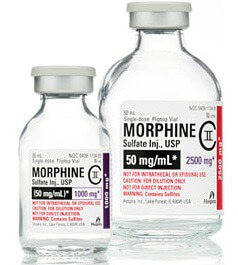Before written records were kept, humankind had already started using opium. The first record of using opium to relieve pain was kept by the Sumerians about 6,000 years ago. Ancient Babylonian and Egyptian etchings also refer to preparing and using opium as a painkiller. Further along into the future, it was said that in Eurasia, Buddha cut off his own eyelids to avoid sleeping, and a violet flowered herb grew where his eyelids fell that would bestow sleep and dreams to all the people of the world. So is morphine an opiate? Read on.
What Are Opiates?
Opiates are narcotic analgesics and depressants that affect the central nervous system. People who use opiates usually develop a psychological and physical dependence and tolerance. The unripened poppy flower’s (papaver somniferum) seed pod contains a milky substance known as opium. There are many kinds of alkaloids in opium, but there is only one group of alkaloids that can be used as narcotics, called the phenanthrene alkaloids. The phenanthrene alkaloids are very addictive and the derivatives of them are governed by international laws.
Is Morphine an Opiate?
 Yes, morphine is an opiate. It is a very powerful analgesic opiate that has intoxicating pain relieving qualities. Clinicians use morphine in hospitals and healthcare centers for pain relief, but morphine is also used as a recreational drug. The latter of which is, of course, illegal. Since morphine is highly addictive, those who use the drug illicitly can develop a serious and abusive physical dependence on the drug.
Yes, morphine is an opiate. It is a very powerful analgesic opiate that has intoxicating pain relieving qualities. Clinicians use morphine in hospitals and healthcare centers for pain relief, but morphine is also used as a recreational drug. The latter of which is, of course, illegal. Since morphine is highly addictive, those who use the drug illicitly can develop a serious and abusive physical dependence on the drug.
Morphine comes directly from the opium of the poppy (papaver somniferum). It is most commonly used to manage pain in clinical settings, often in post-operative and palliative care, also for traumas and advanced cancer pain. Morphine reduces pain and revives hunger, as well as acting as a cough suppressant.
How It Works
With no effect on the patient’s consciousness, morphine is one of the strongest anesthetics available. However, morphine does affect the respiratory system by suppressing it and overuse can lead to fatal respiratory failure. The molecules of morphine can block certain receptors on nerve cells, which obstruct pain receptors thereby obstructing the pain signals to the brain. Morphine acts similarly to the body’s endorphins.
Brand Names
Morphine is available under the following brand names: MS-Contin®, MSiR®, Kadian®, oramorph SR®, RMS®, and Roxanol®.
Street Names
Illicit drug abusers often refer to morphine as Dreamer, Emsel, First Line, God’s Drug, Mister Blue, Morf, Morpho, MS, and Unkie.
Legal Status
Under the Single Convention on Narcotic Drugs, morphine is internationally considered a Schedule 1 drug. It is a Schedule II drug in the United States’ Controlled Substances Act, and a Class A drug in the Misuse of Drugs Act 1971 and Schedule 2 drug in the Misuse of Drugs Regulations 2001 in the United Kingdom. Australia’s State and Territory Poisons Acts classifies morphine as a Schedule 8 drug.
Morphine Abuse and Withdrawal
Morphine helps relieve deep pain, but does not help with fast pain that comes on immediately after injury. The analgesic characteristics of morphine leave the patient feeling somewhat detached and euphoric. This pleasurable side effect of morphine is similar to that of heroin, which makes it quite attractive for recreational drug users. Is morphine an opiate? Yes! Like heroin and other related drugs, morphine is very addictive. The body quickly builds a tolerance for morphine, so larger and larger doses are needed to achieve the ‘high.’
Withdrawal
Due to its physically and psychologically addictive nature, abrupt morphine cessation after a period of regular use, whether it’s years, months, or just weeks, will bring about the symptoms of opiate withdrawal syndrome. The withdrawal symptoms of morphine include insomnia, diarrhea, depression, and goose bumps. The symptoms of morphine and opiate withdrawal generally last around a week to 10 days. It is not uncommon for users to relapse and return to the drug to avoid these symptoms of withdrawal.
Healthy people are generally not at risk for these withdrawal symptoms to become fatal, but they have been lethal to laboratory animals. Many users say that although the physical symptoms of morphine withdrawal are disturbing and horrifically unpleasant, they are manageable. However, the psychological withdrawal symptoms are much more challenging. These symptoms can linger for months, leaving the recovering addict feeling severely bored and depressed.
